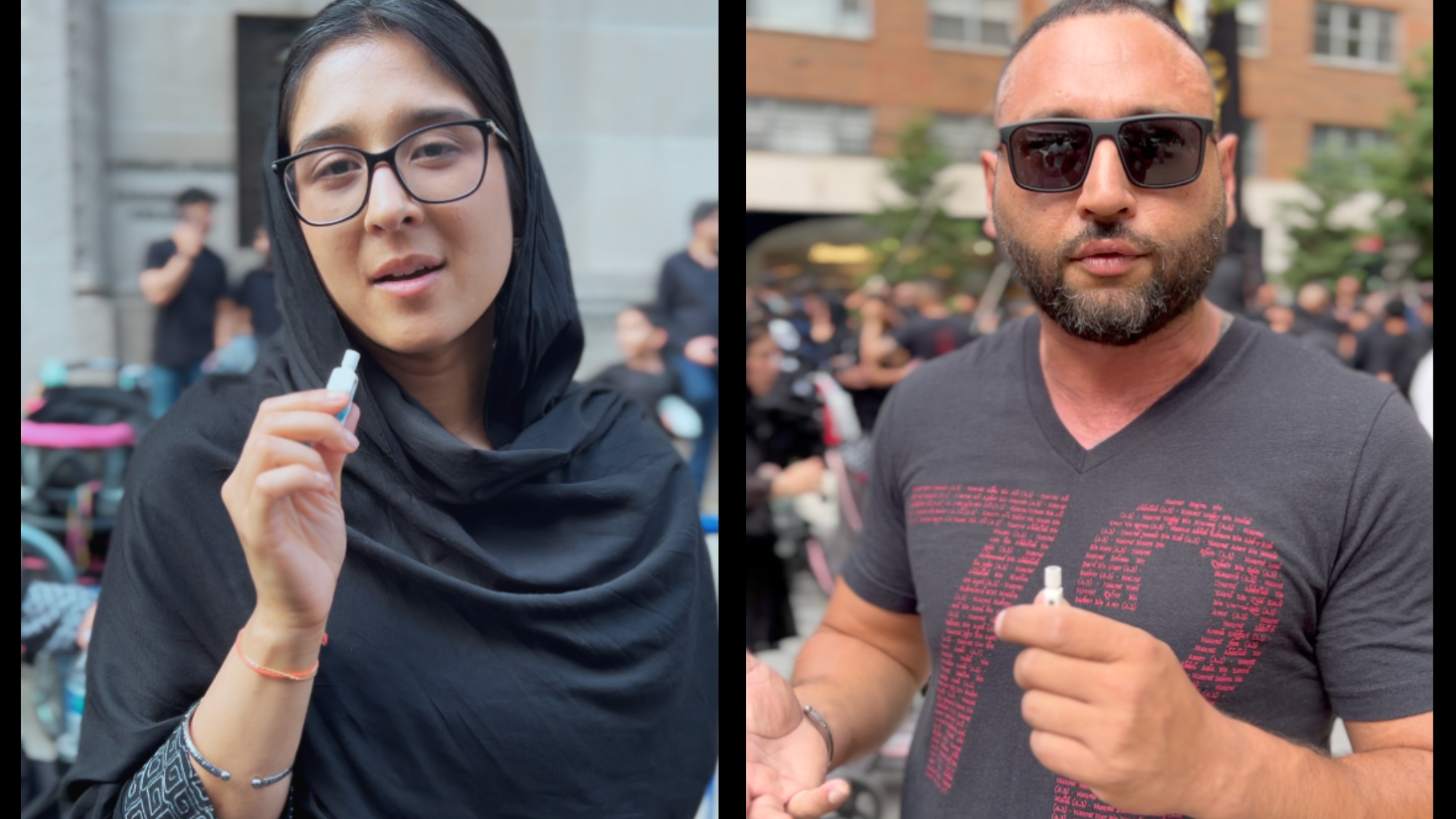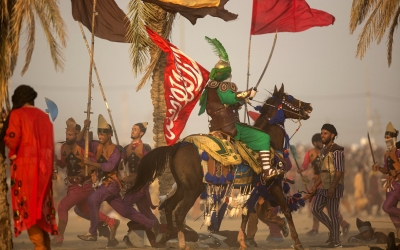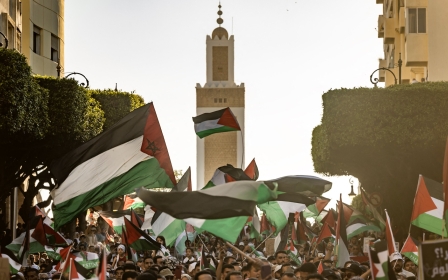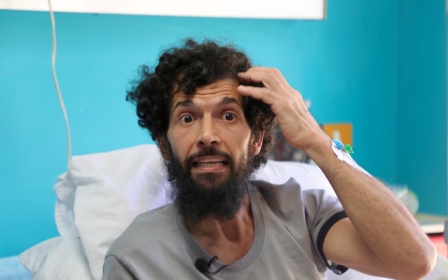New York's Shia Muslims commemorate Ashura in the shadow of Gaza war
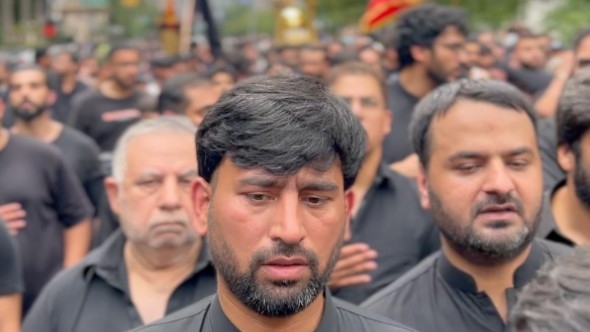
Armina Rizvi says the parallels are uncanny.
As someone who has commemorated Ashura since she was a child, Rizvi says the story's relevance to the events currently unfolding in Gaza, 10 months after Israel declared war on the besieged Palestinian enclave, are remarkably pertinent.
"This is a tradition that I come to every single year," Rizvi explains.
"And it's important for me because it relates back to current issues in today's world, standing up against injustice, like [what's happening] in Palestine."
Rizvi was among the thousands of Muslims who participated in Sunday's annual Ashura procession in Manhattan to commemorate the murder of Imam Hussain, his companions, and his family in the city of Karbala - in what is now Iraq - in 680 AD.
New MEE newsletter: Jerusalem Dispatch
Sign up to get the latest insights and analysis on Israel-Palestine, alongside Turkey Unpacked and other MEE newsletters
For hundreds of millions of Shia Muslims, it's a day that symbolises Imam Hussain's resilience in standing up to injustice and a reminder to stand up for the oppressed.
"This is what we're here to do: to honour the life of Imam Hussain and keep his legend alive and to always remember him for what he stood for," Rizvi says. "Because everything that he did over a thousand years ago can always be translated back to today and how we stand up for Palestine."
At Sunday's event, several of the attendees could be seen draped in the Palestinian keffiyeh, a scarf which is widely considered a symbol of Palestinian resistance.
Carrying shrouds, beating their chests and chanting the names of those killed at Karbala, the cortege was led by men largely dressed in black and carrying flags bearing the name of Imam Ali, the father of Hussain and cousin of the Prophet Muhammad.
Sami Kazmi, from New Jersey, said that the lessons from Ashura reflected the challenges faced by every generation to stand up against tyrants, no matter how powerful they might be.
"We can talk about what happened with the people in Afghanistan because of the war between [the] Soviet Union and the West, and all the way till this day with what's happening in Gaza," Kazmi says.
"[Imam Hussain] basically set an example, that no matter how strong the army is, you need to stand up for what's right."
The story of Ashura
Ashura takes place on the 10th day of Muharram, the first month and one of the holiest in the Islamic calendar, but Sunni and Shia Muslims tend to commemorate the day differently.
Whereas Sunni Muslims see Ashura as symbolic of the Prophet Noah stepping off the Ark, as well as when the Prophet Moses split the Red Sea to help the Hebrews escape the Egyptian Pharoah, Shia Muslims see the murder of Hussain on the day of Ashura as one of grief.
Sunni Muslims also mourn the murder of Hussain, but the battle of Karbala is understood to have led to a deeper emergence of Shia Islam.
Prior to the killing of Hussain, Shia were considered a political faction that supported Imam Ali, the cousin and son-in-law of the Prophet Muhammad. Ali became the fourth caliph in Islam but was murdered in 661 AD and was succeeded by Muawiya, who was the governor of Syria at the time.
When Ali's son Hussain refused to accept Muawiya's decision to bypass shura (consultation with the council) and appoint his son, Yazid, as the heir to the caliphate, a conflict erupted between Hussain and Yazid.
Yazid's forces laid siege to the family, even cutting off the water supply. This culminated in the massacre of Hussain's family at Karbala.
The murders of Ali and Hussain moulded a Shia Muslim trait that emphasised struggling against injustice and oppression.
Kazmi, from New Jersey, says typically the first 10 days of the month of Muharram involves gatherings to mourn and remember Imam Hussain, culminating in the day of Ashura, on the 10th day, in which the actual procession takes places.
"The significance of this day is Imam Hussain was standing up for what's right," Kazmi adds.
The procession
By Sunday afternoon, thousands of Shia Muslims could be seen marching through the streets of New York City in the scorching summer heat.
There were groups chanting in Farsi, Urdu and Punjabi between the haunting, rhythmic thumping of chests, as mourners faced each other and periodically let out the name of Hussain or Karbala in remembrance.
Curious bystanders stood by on the pavement, taking videos or engaged in casual conversation with those participating in the procession.
'We are standing here against injustice and oppression ... of any nationality, of any identity, and any race'
- Taha Ali, procession participant
"We are standing here against injustice and oppression ... of any nationality, of any identity, and any race. It doesn't matter who. This is what this message is," Taha Ali tells MEE.
As the procession came to a close, discussions shifted to the series of attacks that had taken place in Gaza City over the course of the weekend.
Scores of Palestinians were killed and wounded in Israeli strikes on a displaced people's camp in Gaza's Khan Younis, according to the government media office.
Gaza's health ministry said at least 88 Palestinians were killed in Saturday's attack, adding that 289 others were injured.
The war, now entering its tenth month, has turned much of the enclave into an uninhabitable hellscape.
More than 38,000 Palestinians have been killed, and close to 90,000 others have been injured, while whole neighbourhoods have been erased. Homes, schools and hospitals have been devastated by air strikes and scorched by tank fire.
Nearly the entire population is reported to have fled their homes, and those remaining in northern Gaza are on the verge of famine.
"We are marching around everywhere, trying to send our support to the Palestinians after everything that they've gone through," the Chicago-based Rizvi said.
According to reports, the procession in New York City has been taking place since the 1980s with Shia Muslims arriving from the tri-state area for the event. In 2017, the Pew Research Centre Study found that 55 percent of Muslim Americans identify as Sunni, while 16 percent identify as Shia.
Middle East Eye delivers independent and unrivalled coverage and analysis of the Middle East, North Africa and beyond. To learn more about republishing this content and the associated fees, please fill out this form. More about MEE can be found here.


